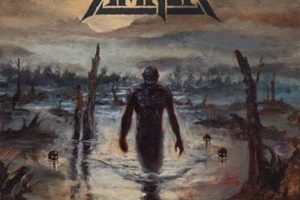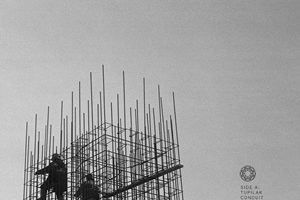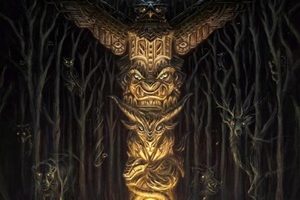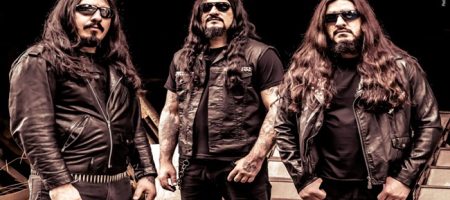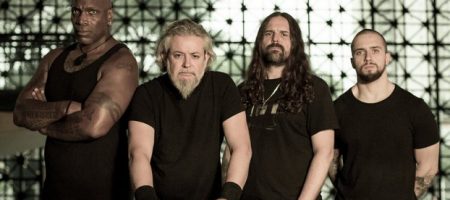Sepultura – Fear, Pain, and Chaos
Tuesday, 28th January 2020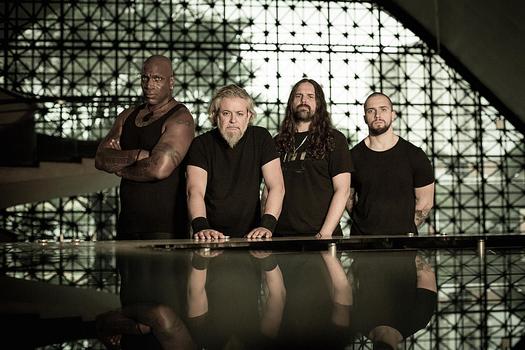
Given their thirty-five year plus career, Sepultura no longer worries about establishing themselves in a post-Max Cavalera world. They’ve released fifteen studio albums to date, toured globally and performed in over eighty countries, and continually adapt and change to scratch their own creative itch no matter what’s popular or in fashion. Their latest album Quadra encapsulates many facets of their back catalog – thrash, groove-metal with Latin rhythms, even their latest endeavors into more instrumental laced efforts and slower, atmospheric terrain.
We reached out to guitarist Andreas Kisser who was happy to fill us in on the concept behind the album, and delve into everything from his outlook on guitar playing, the acceptance of Derrick Greene now decades into the fold, and honest discussion about gaining respect for differences in the world amongst people and how metal can be a connecting force.
Dead Rhetoric: Quadra is the 15th Sepultura studio album, definitely galvanizing the listener with a potent combination of aggression, power, speed, and dynamic twists that harkens back to various periods of Sepultura’s discography. What are your thoughts on the record and what did you hope to get across with this set of songs this time around that differs from previous releases?
Andreas Kisser: Basically it’s a little bit of what you described there. It is influenced by ourselves really – our career, all the momentum, a little more thrashy and old school, and then we did some Brazilian influence with the grooves, instrumentation and percussion. We love to use the orchestras, cellos, now we use a lot of choirs, the acoustic guitar we even used which is something that has been there when I joined the band for Schizophrenia. The instrumental stuff as well.
Machine Messiah was one of our best experiences in the studio. Not only writing but recording with Jens Bogren, that’s why we repeated the whole process by going to Sweden to do Quadra. Machine Messiah was the main influence aesthetically to develop even further – the ideas that we used on Machine Messiah, we toured a lot on that record, we got better with that album. It reflects on Quadra, the album is divided into four to represent these different eras and styles of Sepultura. Side A more of the thrash vibe, Side B more of the groovy and percussive side, Side C more of the instrumental stuff and Side D more of the melodic, slow-paced songs that we did on Machine Messiah. More obscure type, moodier vibe. It’s a journey around what Sepultura always did, plus the new elements that we bring in.
Dead Rhetoric: The album title is the Portuguese word for ‘sport court’ or a limited area of land. Can you discuss what this term means to you as well as how the John North book Quadrivium factors into the lyrical content?
Kisser: The concept started with numerology and algorithms. Nowadays everything is related to that, we are guided by this through social media and numbers. Numbers are everywhere, we tried to codify the universe through numbers. Physics, mathematics, and such – and with this I went to do some research more on the topic, and I found this book Quadrivium, that was about the four liberal arts – cosmology, music, geometry, and mathematics. On the book you have the definition of the numbers, the definition of number four – and that number inspired the whole concept of Quadra. According to Quadrivium, the number four represents the moment of manifestation, where things happen. Which is another concept or definition of the present, of the moment, of the now of Kairos, which is what we talked about on our album in 2010. Everything is related to the present, the past and future, but everything happens in the here and now.
Four was the main root of everything. Quadra by definition is a limited area by which you have these set of rules. It’s life itself, Brazil is a quadra, the United States is a quadra, Canada is a quadra, etc. Imaginary lines that divide people through greed, race, or whatever stereotypes that are invented or created. And quadra brings that question – why do you believe what you believe? Why do you defend ideas that you don’t even know where they came from? The majority of the ideas and the concepts that we have in our minds came implanted by education, university, movies, family traditions, sports. Whatever culture baggage there is, you are a consequence of that. You are a victim of that. We are all victims of our own quadras, you know?
In the end we are trying to say that we should respect that and not create phobias because we don’t understand other cultures where the guy who eats with his hand eats a certain animal or he dresses the way that he dresses, everything has a reason and a meaning. We should respect that – Sepultura has had 35 years of a career, we’ve been to 80 + countries in the world. We play for every type of culture, every type of religion, dictatorships to democracies and everything in between – we really open the doors for these concepts that we have about ourselves and everybody else. That’s where this is relating to. We talk about the prison system, we talk about the food that we eat, we talk about the heroes – we have a song for Muhammed Ali, we have a song talking about depression, etc. Everything is related to concepts – you are a or b, you are black or white, you are Asian.
Why find a color for Asian people? Why do you have to say Asian people are yellow? It’s ridiculous. People really believe in that, and go by this definition, and it creates an imaginary war that doesn’t really exist. In my opinion, that’s why we have so much depression, I’m a man, I’m a woman, I’m transgender- it’s because of these concepts. We should be what we are without having to fit in certain places or on certain shelves.
Quadra should bring about respect for the differences and not attack the differences. We should learn with things that we don’t know or a different point of view about the world, about the cosmos. You see when the Spanish and the Portuguese came down to South America, they destroyed the Incas and Aztecs. How evil is that instead of going into learn (about them)? That’s the kind of stuff that’s really bad and evil. We learn now because of history, but we should have them together creating a society and we could have respected them. In Brazil with the Indians and the natives we have reservations, just like in the United States.
Dead Rhetoric: Where do you believe you’ve taken your guitar playing and songwriting from your early days of Sepultura to current times? Has your outlook changed or just evolved naturally?
Kisser: I think it changed a little bit, especially during the Chaos A.D. / Roots days. I was tired of the arpeggios and all those leads, I went to the opposite way. Everyone was trying to copy Yngwie Malmsteen, Steve Vai, Joe Satriani – I love those guitar players, but I’m not them. I went to a different place because Sepultura was exploring more of the Brazilian percussion. I started to play my lead guitars more related to that percussive element, instead of normal lead guitar lead scales that everybody was using. That’s why I started using more of the dissonance patterns and connecting more to the percussion. In doing so, I created a different signature sound. It influenced other bands.
Since then on the latest albums like The Mediator… and especially Machine Messiah, I have been picking up my guitar playing again, giving it more attention to the leads. I never stopped studying music, I still play classical guitar a lot, every time possible I study the instrument. I spent more time with my guitar, more patterns and leads, experimenting a lot more. The new drummer Eloy Casagrande brought a lot more possibilities to my writing and my guitar playing. I’ve evolved a lot more in the last ten years compared to what I was doing before then.
Dead Rhetoric: In previous interviews with some other musicians in the thrash field, they often cite the fact that audiences seem to clamor worldwide to Sepultura live – where seeing the band ends up be an annual event or pilgrimage they look forward to. How does that make you feel, and what do you get out of performing live that differs from the studio work?
Kisser: It feels like the Grateful Dead (laughs). Like the Sepultura circus. No, it’s great – it’s been 35 years of a career. We have so many different types of fans, older fans that are still with us, other fans who don’t listen to the band or style anymore because of the changes. It feels so great that we are still here, even after so many changes – technological changes with the music business, how we sell music today compared to thirty years ago. We’ve survived member changes, managers, record label changes -because we love what we do, we love our music, and we love the challenge. It’s driven by challenge. In art, the comfort zone is always the worst thing that can happen. We always instigate the challenge, the new things we could achieve and do. I think that’s why Sepultura albums are so different from each other, we don’t like to follow or copy any formulas that we have used in the past. Of course we have the experience of working with great producers and doing the right and wrong things, we learn of course.
The aspect of the present, of the new, of the unknown, that’s where you do new things. That’s where art really is, we go to the unknown territory where we create new things. And it’s great, as we have fans that follow those changes and really understand where we are coming from. The concepts really help the fans understand what we are talking about. It’s really exciting for Sepultura – we’ve put out two songs from the album, and the feedback has been amazing. We usually don’t get that kind of response for the singles, it creates this new expectation for the band as well as the fans, which is great.
Dead Rhetoric: Do younger musicians or bands ever seek you out for tips and advice when it comes to their activities, either on a musical or business level – and if so, what types of things do you talk to them about?
Kisser: Yes, sure. People ask for tips, and business-wise it’s really hard to say because every band has a way of doing things. There’s not a formula, it doesn’t exist one way. What works for Metallica is not going to work for Sepultura or work for Death Angel. Each one of us has our own way of doing business for good or bad. You are going to find your way, and find the right people. That’s key to find good partners that are going to stay with you and have the same type of objectives and goals, really to build something together.
And musically, I always say to play the music that you really like, regardless of the style. If you like samba, lambada, jazz, or blues – go for it. Sepultura was like that, even before I joined the band they were doing really rude, crude death metal and talking about Satan and the antichrist in the most religious city in Brazil. Tried to really shock and create new possibilities for the youngsters growing up. We never change for radio, for a manager, or A + R guy. I remember Monte Conner was our A + R guy when he signed Sepultura – and when he came to the studio on Arise, we had to kick him out. Do your job – but don’t touch the fucking knobs (laughs)! That’s not your job, he respected that. That’s how we always fought for our artistic freedom. You signed Sepultura, and now you decide you want to change everything. That doesn’t make sense.
Monte was very important in our Sepultura career, he signed us – but music is another world. Monte was not a musician, and A+R has a different perspective on selling the record which is very important – but that’s just the second stage. We present the music and that’s our way of communicating. This is our message- not your message. Do what you like and do what you believe in. Prepare yourself, studying music is important, to be prepared for different situations on stage and in the studio. You need to use your technical abilities, your knowledge and theory. The most important thing is to enjoy what you do. And we still do.
Dead Rhetoric: Did worry/fear ever set in about the faithful Sepultura fans embracing Derrick as the vocalist for the band? Did you ever think about the band splitting up because of this, and how did you guys work your way through it?
Kisser: No, we never thought about that. Changing a singer is always difficult- especially Max who was a very strong personality, image. Of course bringing Derrick in, a totally different guy, a black guy in the metal scene which is very rare. We are not here to please everyone – if you don’t like it, fine. If you like it, fine. We are not here as a church or a religion to indoctrinate people, or make people believe in it what I believe. This is art, somehow it’s going to touch people in a good and a bad way. The influence is there.
People talk shit about Sepultura, but they are still talking about Sepultura, you know? We never thought about pleasing anyone, who is the fan of Sepultura? It’s very hard to create a stereotype of a Sepultura fan, you know? We have grandmothers to little kids that like Sepultura. Some people like a specific period of time, or an album, or everything. Thirty-five years of a band, so it isn’t like an Iron Maiden fan who you can see from far away. Our albums show that, we are very diverse and we are not really locking into a specific thing. We do music because we like to do music.
Dead Rhetoric: Can you think of an album in the band’s back catalog that maybe is underrated by the fans and media that you think more people need to spend more time investigating and consuming?
Kisser: I don’t know. Probably the early Derrick albums that people really denied, Against and Nation. Especially Against, I think it’s a great album. It was one of the most difficult albums in our career, we lost Max, we lost the management, we lost the trust from the label. We lost everything that had taken ten years to build, Max took everything including Andy Wallace and Ross Robinson to produce the first Soulfly album. We had to start from scratch, finding a new producer, a new manager, a new singer – it took a year and we took our time. We took our time, and it was the right choice as he’s still here after 21 years. It’s great, Against is an album that I suggest for people to go back and listen without the prejudice relating to when it came out. Roorback is an obscure album as well.
Dead Rhetoric: Is it a tough balancing act with fifteen albums to decide when pulling together a live set list what to do with the old and the new?
Kisser: It’s difficult for sure. There are four or five songs that we have to play, at every show, regardless of the setlist. “Roots”, “Refuse/Resist”, “Arise”, those songs have to be on the setlist. We are focusing on the new album, Machine Messiah was like that too – we focused on five / six songs for the new album. Quadra will be the same – we will not forget our past though. As long as you have a concept about the tour, it really makes it easier to try to find the right songs to pick for that setlist. We have fast songs, heavy songs, groovier songs – we could build five or six different setlists from the songs that we have. Once you have a concept with the new album and the new tour, it makes it easier to find the right songs to be in the set list.
Dead Rhetoric: What is on your bucket list left to accomplish – either with Sepultura, or for yourself personally?
Kisser: I don’t think too much about that. We live too much on the present. Doing things now, I don’t have to drain my energy in the future or the past. We work with goals and calendars, we have another two years for the touring. We have a North American tour with Sacred Reich, Crowbar, and Art of Shock, summer festivals being announced. We want to go back to Europe for a headlining tour, and a South American tour, etc. We go by that, it’s amazing that we are still here. Our history, the changes, and we have momentum. I don’t spend too much time dreaming.
Dead Rhetoric: Tell us about the radio show that you host with your son Yohan called Pegadas de Andreas Kisser that you’ve been doing since 2013- how much of a thrill has it been to channel your love of music with your family in this way?
Kisser: It’s amazing, man. It’s such a privilege to have this show in Sao Paulo, it’s the 8th year now that we are doing (this). My son started with me when he was with short hair, very young. Now he has long hair and he’s playing the guitar better than me (laughs). He has his own band, and we have our own band together called Kisser Clan, where we play covers. It’s great to develop to this friendship with your son – to teach him and show him the albums, my vinyl collection, my guitars. He writes great, he studies music, all the theory.
On the radio, we open most of our time for Brazilian bands, to show their music. It’s very hard even today to find outlets for music, and metal in general. 80% of the stuff that we do is for Brazilian bands, I do interviews on the road. I know so many people in bands, Gary Holt, Bobby Blitz, and all those guys I interview. It’s a lot of fun, working on the radio is great. When I am in Brazil I do it live, every Sunday- but of course most of the time I’m on the road so I pre-record it. Some of the shows I send from the road. I learn a lot as well with the bands, it’s fantastic.
Dead Rhetoric: What’s on the agenda for supporting the record over the next year or two – as you’ve already announced the headlining tour for North America in March/April?
Kisser: This will be a special tour – we are preparing a very special show. We are building everything now from like the setlist to the backdrop and all the special things we want to put on stage. Visually it’s going to be great. We are going to focus on Quadra, and we will play as much as we can from the new album without forgetting about our history. And that’s it, I’m excited to be on the road. Can’t wait to get out there.











